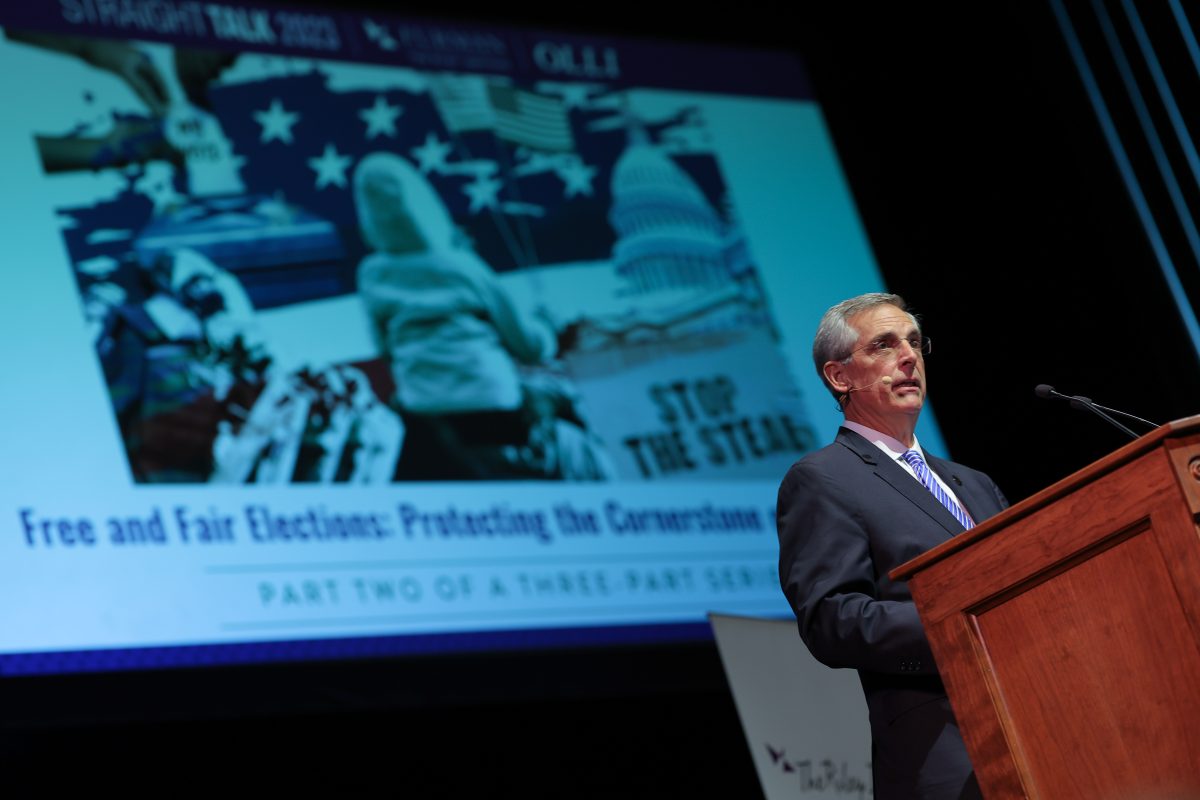Audience members of the second installment of the Riley Institute’s StraightTalk erupted in a standing ovation after the introduction of Brad Raffensperger to the stage. Meanwhile, a small group gathered outside of McAlister Auditorium in protest.
These mixed reactions came in the wake of the second session of StraightTalk: Our Fragile Democracy, hosted by the Riley Institute and OLLI@Furman on Sept. 6.
The session, titled “Free and Fair Elections: Protecting the Cornerstone of Democracy,” featured Brad Raffensperger, Georgia’s Secretary of State, who gained recognition after refusing to aid former President Donald Trump in overturning 2020 election results in Georgia. On Jan. 2, 2021, Trump called Raffensperger’s office, requesting to “find 11,780 votes” in Georgia after Biden had narrowly won the swing state.
Drawing on this experience, Raffensperger’s talk sought to provide facts against the suspicion that the 2020 election was “stolen” and to explore hypotheticals about voter security in the 2024 election. He was joined by Lawrence Norden, senior director of the Elections and Government Program at the Brennan Center for Justice.
Norden spoke first, providing an overview of developments during and since the 2020 election that have threatened fair elections. He noted the passing of restrictive voting laws in certain states which were justified by claims already “dismissed by the courts,” he said. As an example, he cited Texas S.B. 1 which required mail-in ballots to be rejected based on minor paperwork errors or omissions. The law was later found to be in violation of the Civil Rights Act of 1964.
He also spoke on increasing enmity for election officials and violence directed toward them, citing the example of Leslie Hoffman of Arizona. Hoffman’s Facebook hate comments were “vile enough” that they prompted her to seek protection from her county sheriff.
Raffensperger talked next, briefly providing evidence against claims of voter suppression advanced by former gubernatorial candidate Stacey Abrams after Georgia’s 2018 gubernatorial election.
“I understand how polarized we are. And that’s why I’m not allowed to make mistakes here,” Raffensperger said.
He also emphasized that despite his Republican party affiliation, his goal is not to advance one party’s agenda but to “make sure that people have the opportunity and the security so they can exercise that right (to vote).”
After looking through Raffensperger’s history as Secretary of State, members of Furman’s Young Democratic Socialists of America (YDSA) expressed concerns with his claim to credibility.
“Most people have only heard of Brad Raffensperger from his refusal to lie about votes for Trump, causing many to herald him a hero of free and fair elections, but Raffensperger has actually been involved in voter suppression in Georgia for years,” Liron Golan ‘25 said in an email statement.
“What’s not being discussed inside that building is the fact that he purged 309,000 voters from the Georgia voter rolls,” YDSA member Steven Rainey ‘25 said. “Of course, these were overwhelmingly black and working class voters from urban areas.”
While Raffensperger did not comment on allegations of voter purging, he chose to discuss another controversial law passed during his term: Georgia S.B. 202.
Passed in 2021, the law restricts the amount of time voters have to request absentee ballots and reduces the number of absentee drop boxes. Raffensperger is a defendant in an ongoing lawsuit set forth by the League of Women Voters and partners against S.B. 202, which they have accused of “discriminating against Black voters and other voters of color.”
“So really, it’s a lot of management tools,” said Raffensperger in the questionnaire portion of the talk. He cited S.B. 202 as one of a number of efforts the state legislature has taken to increase the efficiency of processing votes and to reduce voter fraud.
Protestors also accused Raffensperger of being involved with gerrymandering in Georgia.
“He’s been sued for racial gerrymandering — redrawing district lines intentionally to diminish the power of the Black vote,” Golan said.
Due to the lawsuit Golan mentioned, Raffensperger chose to limit his commenting on the issue. But he emphasized that even in attempting to create a non-partisan redistricting commission, “people still bring their biases to these commissions…then sometimes there’s lawsuits.”
He also expressed his view that if the redistricting commissions have issues, “the courts will fix it.” In regard to gerrymandering, he said, “I think at the end of the day, it will reset itself.”
As the YDSA protest wrapped up outside, Norden and Raffensperger ended their talk with a message on the importance of having productive conversations with those of differing political beliefs.
“Larry and I are on different sides of the aisle, but we can sit here tonight and have respectful conversations,” Raffensperger said.




































